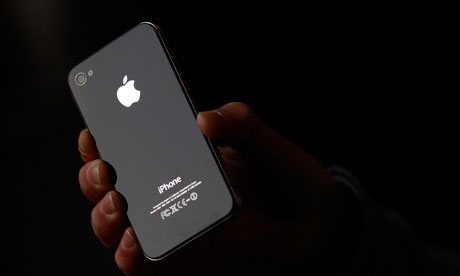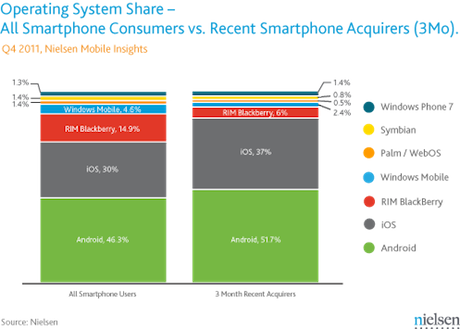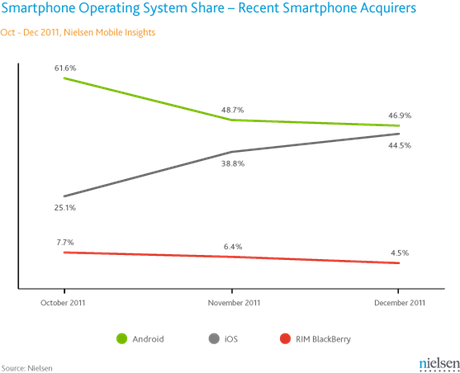| ||
| ||
| ||
| Ice Cream Sandwich on Android tablets: A visual tour Computerworld (blog) By JR Raphael (@jr_raphael) We've heard all about how Google's Android 4.0, aka Ice Cream Sandwich, is changing the face of the Android phone. But what does the new software mean for the Android tablet? Ice Cream Sandwich, after all, ... See all stories on this topic » | ||
| iPhone 4S wooing lots of Android, BlackBerry users CNET A hefty 36 percent of iPhone 4S buyers said they jumped ship from an Android, BlackBerry, or Palm device, according to a study released yesterday by Consumer Intelligence Research Partners (CIRP). Specifically, 50 percent of the rival phone jumpers ... See all stories on this topic » | ||
| mSecure for Android is Now Available On the Nook Color and Nook Tablet San Francisco Chronicle (press release) mSecure Password Manager for Android is now available on the App Store for the Nook Color and Nook Tablet eBook products. mSecure is one of the leading password managers for both desktop and mobile devices, with the latest version supporting improved ... See all stories on this topic » | ||
| Bestsellers: Android's Paid Market Is Alive, But Skews To Techie Tweaks MocoNews But a glance at Android's app charts shows users will pay, and sometimes handsomely. The current top paid Android app costs $14/£9.45 and has been downloaded hundreds of thousands of times in the last month, according to Android Market. See all stories on this topic » | ||
| Apple's "thermonuclear war" against Android is an expensive dud VentureBeat This morning Reuters reported that Apple had lost an appeal to ban Android tablets in the Netherlands. It's another failure for an expensive legal strategy that has done nothing to stem the growth of Android's marketshare in the smartphone and tablet ... See all stories on this topic » | ||
| Ingenious Med Expands Mobility with Android Sacramento Bee 24, 2012 -- /PRNewswire/ -- Ingenious Med, the leading platform for inpatient physician management and automated charge capture, announced its solution is now available on the Android Market for Android mobile devices. Ingenious Med's online and ... See all stories on this topic » | ||
| Lookout's Mobile Threat Tracker Shows Where All That Android Malware Is [VIDEO] Mashable If you've got an Android phone, you've probably been increasingly concerned about malware, which flared up a few times over the past year — even showing up in the official Android Market at one point. But just how bad is the problem? See all stories on this topic » |
| ||
| Chart: Android Is Catching Up To iOS In Mobile Video Views ... By Erick Schonfeld With 250 million Android devices out there, growing by more than 700000 activations a day, a lot of mobile video is watched on Android cell phones and tablets. It is not quite as much yet as on Apple iOS devices but it is catching up fast. TechCrunch | ||
| Android + Kinect + Projector = $&#%@^! [Video] - Phandroid By Chris Chavez Okay, so I wont even pretend to know what's going on here but I immediately wanted to dismiss it as some kind of dark arts or voodoo. Well, that or 21st century. Android Phone Fans | ||
| Dolphin Browser adds Evernote, Skitch functionality | Android ... By Michael Crider Dolphin Browser HD remains one of the most popular third-party browser alternatives for Android with over ten million downloads, and at least part of that is. Android Community | ||
| Sony ST25i 'Kumquat' Android smartphone possibly leaked By Todd Haselton Next month we're sure to hear about the latest smartphones from several of the world's largest phone makers during Mobile World Congress, however that. BGR: The Three Biggest Letters In Tech | ||
| Android may finally surpass iOS for developers in 2012 | VentureBeat By Jolie O'Dell While Android has for sometime been outpacing iOS on the consumer side in terms of growth and market share, developers have still clung to iOS for building new apps. However, new research shows that 2012 might be the year that changes. VentureBeat |
Tip: Use quotes ("like this") around a set of words in your query to match them exactly. Learn more.
Delete this alert.
Create another alert.
Manage your alerts.







